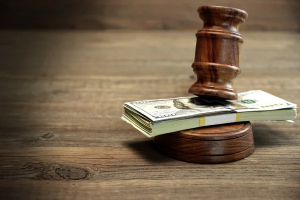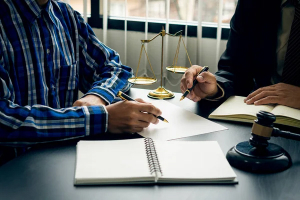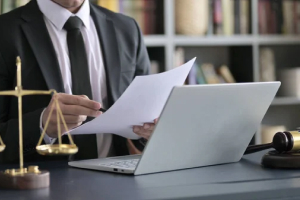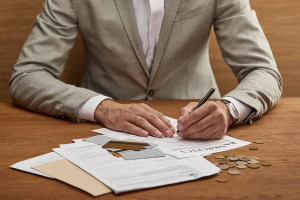
Are you considering bankruptcy but feeling overwhelmed by the complex legal process? Hiring a bankruptcy lawyer is often the best decision you can make. With their expertise, they can guide you through bankruptcy, protect your assets, avoid costly mistakes, and help you make informed decisions about your financial future.

When hiring a bankruptcy lawyer, you should expect more than legal representation. Your attorney should go above and beyond to provide you, the client, comprehensive and compassionate support throughout the bankruptcy process.
An initial consultation
Your experienced bankruptcy attorneys will begin by offering a free initial consultation to assess your case and provide an overview of your options. They'll take the time to listen to your concerns and answer any questions, so you can decide how to proceed.
Complete all necessary forms for filing for bankruptcy
Once you decide to proceed with bankruptcy, your legal team will handle all the bankruptcy paperwork and filings essential to start the process.
Guide you on available choices, including what sort of bankruptcy to file.
Based on your circumstances, your attorney will work with you to determine the best type of bankruptcy to file, whether filing for Chapter 7 or Chapter 13 bankruptcy or pursuing other debt-relief options. He will keep you informed on every step.
Representation in court
When your case goes to bankruptcy court, you can trust that your skilled attorneys will be there to provide representation and support. They'll work tirelessly to protect your rights and interests and use their knowledge and experience to help you achieve the best possible outcome.

Several types of bankruptcy are available under the United States Bankruptcy Code, but the two most common types for individuals are Chapter 13 and Chapter 7.
Chapter 7 Bankruptcy
Chapter 7 bankruptcy is also called "liquidation" bankruptcy. It entails the sale of non-exempt assets to repay creditors, with certain debts being completely discharged (eliminated). Those with little to no disposable income and a substantial amount of unsecured debt, such as credit card debt or medical costs, generally file for Chapter 7 bankruptcy.
Chapter 13 Bankruptcy
Chapter 13 is also known as "reorganization" bankruptcy. It involves creating a repayment plan to repay some or all of the debt for 3-5 years. Those with a regular income typically use this type of bankruptcy and can make regular payments towards their debt but need help restructuring their payments to make them more manageable.
Other types of bankruptcy are available, such as Chapter 11 bankruptcy (primarily used by businesses) and Chapter 12 bankruptcy (used mainly by family farmers and fishermen). Still, these are less commonly used by individuals.
The specific type of bankruptcy right for you will depend on your circumstances, such as your income, assets, and types of debt. It's essential to consult with an experienced bankruptcy attorney to determine the best course of action for your situation.
A bankruptcy lawyer is an attorney who specializes in helping individuals and businesses navigate the process of filing for bankruptcy. Bankruptcy lawyers are well-versed in bankruptcy law, a specialized area of law that deals with the legal process of resolving debts and providing financial relief to those struggling financially.
A bankruptcy lawyer can provide a range of services to their clients, including
Bankruptcy lawyers work closely with their clients to understand their unique circumstances and develop a strategy that meets their needs and goals. They can provide invaluable legal advice and representation to help their clients achieve a fresh start and progress.
See also: Florida Chapter 13 Bankruptcy Attorney and Florida Chapter 7 Bankruptcy Attorney.

Consulting with a bankruptcy lawyer may be a good idea based on your situation. bankruptcy can be complicated, and a lawyer can provide valuable advice and guidance.
You're tired of hearing from debt collectors.
They've been calling all day, and you're sick of it. The calls make you lose sleep at night, and it causes a lot of stress. You feel like the calls are going to drive you crazy! You want them to stop but don't know what to do.
You're worried about the bankruptcy paperwork.
You want to fill out the papers and ensure your chances of getting rid of your debts. The documents might need clarification, and you could get something wrong, making things worse.
You're hesitant to handle the bankruptcy case on your own.
While it is possible to file a bankruptcy petition independently, the process can be challenging, and there are many potential pitfalls to be aware of. A bankruptcy lawyer can help you avoid mistakes and ensure that your case proceeds as smoothly as possible.
When filing for bankruptcy, you might wonder how much it will cost. It depends on what kinFiling for Chapter 7 bankruptcy, which in the most straightforward cases, can be done in a few months. Your lawyer will charge you a single flat fee to handle your case.
Even though federal bankruptcy rules are the same everywhere in the U.S., fees can vary by lawyer and by region. You could pay as little as $500 or as much as $2,000, but most people spend between $1,200 and $1,500. But, your fee may be higher depending on your finances' complexity.
Before your lawyer files your case, you must pay your lawyer's fee in full. Once you've filed Chapter 7, it's against the law for any creditor, including your lawyer, to try to get money from you. You'll also have to pay the court a filing fee of $338 in 2021. If you don't have the money to pay the fee, you can ask to waive it.
Chapter 13 bankruptcy is more complicated and time-consuming than Chapter 7 bankruptcy, resulting in greater legal bills. Typically, Chapter 13 requires developing a payment plan that can take up to five years to execute. It is very uncommon for attorneys' fees to range between $2,000 and $5,000, which can be much higher in complex cases.
The excellent news about legal expenses under Chapter 13 is that they are frequently included in the monthly payment plan designed to assist you in repaying your creditors. So you can devise the money at a time, as you would under Chapter 7. While filing a Chapter 13 petition with the court, an upfront cost (currently $313) is required.
In every bankruptcy case, the court appoints an administrator known as a trustee. Whose duties include:
Also, in Chapter 13 bankruptcy cases:
The trustee is also responsible for reviewing the attorney's fees. If the trustee deems any expenses excessive, they can force the attorney to return them. If you believe any fees are extreme, you can request that the trustee examine them.

Here are some steps to find an experienced bankruptcy lawyer:
Referrals
Ask friends, family members, or colleagues who have been through a similar situation for recommendations. If they had a positive experience with their bankruptcy lawyer, they might refer you to the same attorney.
Bar Associations
Check with your state or local bar association for a list of bankruptcy attorneys. The bar association can also provide information about the attorney's disciplinary record.
Online Search
You can search for bankruptcy attorneys online. Many law firms have websites that provide information about their practice areas, attorney bios, and contact information.
Consultation
Once you have found a few attorneys that meet your needs, schedule a consultation. Most attorneys offer free or low-cost initial consultations. During the consultation, ask questions about the attorney's experience, fees, and approach to handling your case.
Choosing an attorney specializing in bankruptcy law with experience handling similar cases is essential. It would help if you felt comfortable with the attorney and confident in their ability to represent you in your bankruptcy cases.
Bankruptcy can have a significant impact on your credit score and creditworthiness. Here are some of the ways that bankruptcy can affect your credit:
Negative impact on credit score
Filing for bankruptcy can drop your credit score, which is viewed as a significant adverse event. Depending on your starting credit score, a bankruptcy filing can result in a decrease of up to 200-240 points.
Bankruptcy on your credit report
Bankruptcy stays on your credit report for a significant time. Chapter 7 bankruptcies can remain on your credit report for up to 10 years, while Chapter 13 bankruptcies can remain on your account for up to 7 years.
Limited credit opportunities
After filing for bankruptcy, you may find getting credit or loans difficult. Even if you can get credit, you may be subject to higher interest rates and fees due to your increased risk profile.
It is important to note that while bankruptcy can impact your credit, it is not permanent. Over time, with responsible credit use and on-time payments, you can begin to rebuild your credit score. It may take time and effort, but you can work towards a better financial future with patience and persistence.

Filing for bankruptcy without the help of a bankruptcy lawyer can be risky. Bankruptcy laws are complex. Navigating them without the proper knowledge can lead to severe consequences. Here are some of the risks associated with filing for bankruptcy without a bankruptcy lawyer:
Making mistakes on your bankruptcy forms
Bankruptcy forms can be complicated, and even minor errors can lead to your case being dismissed or delayed. An experienced bankruptcy lawyer can ensure that your documents are filled out correctly, minimizing the risk of any issues arising.
Losing assets that could have been protected
Bankruptcy laws allow certain exemptions that protect your assets from being seized by creditors. A bankruptcy lawyer can help you identify which exemptions apply to your situation and ensure you take advantage of all available protections.
Dealing with creditors
Bankruptcy can be stressful and emotional, and dealing with creditors can be overwhelming. A bankruptcy lawyer can handle communications with creditors on your behalf, reducing stress and protecting your rights.
Missing important deadlines
Bankruptcy involves strict deadlines that must be met to ensure that your case proceeds smoothly. A bankruptcy lawyer can help you stay on top of these deadlines and ensure your case moves forward promptly.
In short, filing for bankruptcy without a bankruptcy lawyer can lead to severe consequences that could have been avoided with the help of an experienced professional. If you are considering bankruptcy, it is highly recommended that you seek the advice of a qualified bankruptcy lawyer.
There are several benefits to hiring a bankruptcy lawyer:

You do not need to live with the fear of being unable to pay your debts anymore. Our bankruptcy lawyers at Fleysher Law are here to help you get back on track.
Schedule an appointment today at (888) 886-0020, and let's discuss your situation.

"*" indicates required fields